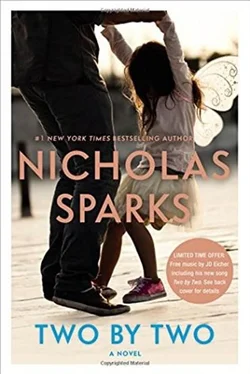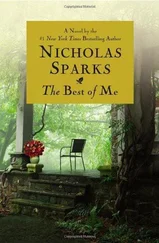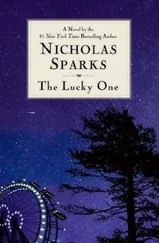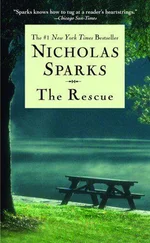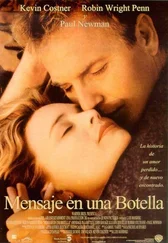But talking to Marge did little to make me feel better, and in the end, I called Emily and asked if she could meet me for lunch.
Considering how furious I was, I wanted to avoid going to a restaurant. Instead, I asked her to meet me at a park near the house, where there was a scattering of picnic tables. Not knowing what she would want, I ordered two sandwiches from the deli, along with two different kinds of soup. I added some bags of chips to the order, along with two bottles of Snapple.
Emily was already seated at one of the tables when I pulled into the gravel lot. Parking beside her, I grabbed the food and strode to the table.
I must have looked upset as I approached, because she rose from her seat and gave me a quick hug. She was wearing shorts, a peasant blouse, and sandals, similar to what she’d worn when we’d walked the golf course together. “I’d ask how you were doing, but it’s pretty clear it’s a bad day, huh?”
“Definitely a rough one,” I admitted, more affected by the feeling of her body against mine than I felt comfortable acknowledging. “Thanks for meeting me here.”
“Of course.” She sat as I laid out the food on the table and took a seat across from her. Behind us, preschoolers were clambering over a small wooden structure featuring low slides, bridges and swings. Mothers either stood nearby or sat on benches, some fiddling with their phones.
“What’s going on?”
I ran through the conversation I’d had with Taglieri. She listened with a frown of concentration, inhaling sharply at the end, her eyes slitted in disbelief.
“Would she really do that? Put London in the middle of a fight between the two of you?”
“Taglieri seemed to think it wasn’t just possible. He believes it’s probable.”
“Oh, boy,” she said. “That’s terrible. No wonder you’re upset. I’d be furious.”
“That’s an understatement. Right now, I can barely stand the thought of her. Which is strange, because ever since she left, it seems like all I’ve wanted was to see her.”
“It’s really hard,” she said. “And until you go through it, you can’t know what it’s like.”
“David wasn’t like this, was he? You said that he was generous when it came to money and you got custody of Bodhi.”
“It was still terrible. When he walked out the door, he was seeing someone, and for the next month, I kept hearing from people I knew who’d seen him out and about with this woman, acting like he didn’t have a care in the world. It was totally demoralizing, evidence that ending the marriage and losing me mattered not at all to him. And while he was generous in the end, he didn’t start out that way. He talked at first about bringing Bodhi with him to Australia.”
“He couldn’t do that, could he?”
“Probably not. Bodhi’s an American citizen, but even the threat caused me a few weeks of sleepless nights. I couldn’t imagine not being able to see my son.”
It was a sentiment I could fully relate to.

After lunch, I returned home instead of going back to the office. On the mantel and walls were dozens of photographs, mostly of London. What I hadn’t noticed in all the years that I lived there was how many photos of London included Vivian-almost all professionally shot-while only a few candid ones of London and me graced our home.
Staring at them, I wondered how long Vivian had considered me so marginal to my daughter’s existence. Perhaps I was reading too much into it-while Vivian was with London, I’d been at work, so of course there were more photos-but why hadn’t she noticed and rectified the situation? Why hadn’t she tried to memorialize more moments with the three of us, so that London could see for herself that I loved her as much as Vivian did?
I wasn’t sure. What I did know was that I didn’t want to be constantly reminded of Vivian, which meant some things had to change. With newfound resolve, I walked through the house, removing the photos that included Vivian. I had no intention of throwing them away; I put a number of them in London’s room while I stacked others in a box that Vivian could take back to Atlanta with her, stowing the box in the foyer closet. Afterward, I changed into a T-shirt and shorts. Heading to the family room, I began to rearrange the furniture. Couches, chairs, lamps-I even moved a painting from the den to the living room and vice versa. By the time I was done, I couldn’t claim that it looked better-Vivian did have good decorating sense-but it definitely looked different. I did the same in the den, moving the desk to an alternate wall, shifting the bookshelf and flipping the location of two paintings. In the master bedroom, I kept the bed in the same place, but moved all the other furniture I could, and then switched out the duvet on the bed for another that I found in the linen closet, one that hadn’t been used in years.
In another closet, I found assorted household goods, and I spent a few minutes switching out vases and lamps, along with some decorative bowls. One good thing about Vivian’s shopping over the years, I suppose, was that my overstuffed closets held the equivalent of a department store.
As soon as London got home from school, she took in her surroundings with wide eyes.
“It looks like a new house, Daddy.”
“A little bit,” I admitted. “Do you like it?”
“I like it a lot!” she exclaimed. Though her endorsement made me feel good, I suspected that it never occurred to London not to like it. With the exception of dance class, London seemed to like everything.
“I’m glad,” I said. “I didn’t move anything in your room.”
“You could have moved the hamster cage if you wanted to.”
“Do you want me to?”
“They’re still kind of noisy at night. They run on that wheel as soon as it gets dark.”
“That’s because they’re nocturnal.”
She looked at me like I was crazy. “Of course they’re not turtles . They’re hamsters.”
“Nocturnal,” I said, slowly enunciating the word. “That means they like to sleep during the day.”
“You mean so that they don’t miss me while I’m at school?”
I smiled. “Exactly.”
She was quiet for a few seconds. “Hey Daddy?”
I loved the way she said those words when she was about to ask me for something, and I wondered how old she would be when it finally stopped. Or if, by then, I’d even notice.
“Yeah, sweetie?”
“Can we go for a bike ride?’
Between my workout that morning and redecorating efforts, I was already exhausted, but Hey Daddy won out, as it usually did.

For the first time, I remembered to slather sunscreen on my daughter.
It was, however, the end of September and relatively late in the afternoon, so it probably fell into the category of too little, too late.
London donned her helmet and as soon as I helped her get going-she still couldn’t do that part on her own-I hopped onto my bike and pedaled quickly to catch up to her.
While the roads near our house offered wonderfully flat, long stretches, the streets on the far side of the neighborhood had hills. Not big hills, mind you; in my youth, I probably would have considered them boring. I preferred racing down the steepest hills, the kind that made me squeeze the handlebars so tight I’d lose feelings in my fingers, but London and I were different in that regard. The thought of going faster and faster, without pedaling, made London nervous, and so far we’d avoided the hilly roads.
It was the right thing to do, especially early on, but I felt that she’d reached the point where she could handle a shallow downslope, and we rode in that direction.
Читать дальше
